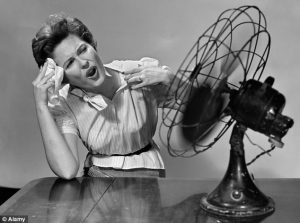 Every year at this time we get calls from customers who have an issues. Their air conditioner, while working some, just isn’t up to the demand of the heat wave we are experiencing. These customers just want the air conditioner to do its job and keep the temperature at a reasonable and comfortable temperature when it is 100? outside. These systems have a tricky job and it’s not just to lower the temperature of a home on the hottest 10 days of the year. They also must lower the humidity of the space on both hot days and just uncomfortably warm days to create a healthy indoor environment year round and avoid the specter of mold.
Every year at this time we get calls from customers who have an issues. Their air conditioner, while working some, just isn’t up to the demand of the heat wave we are experiencing. These customers just want the air conditioner to do its job and keep the temperature at a reasonable and comfortable temperature when it is 100? outside. These systems have a tricky job and it’s not just to lower the temperature of a home on the hottest 10 days of the year. They also must lower the humidity of the space on both hot days and just uncomfortably warm days to create a healthy indoor environment year round and avoid the specter of mold.
The Bad News – We all need to be reasonable in what we expect from our systems.
The industry standard Manual J, which is used to design the systems we install, seeks to create a system that can keep a home at 75? on a 92? day, a 17?difference. Most of our systems can maintain 75 degrees on a 95?day, a 20? difference. However sometimes, this is a challenge with upstairs systems.
But my current system needs to work better now!
Understood, let’s think this through, we have options. Your system has two parts. Think of your air conditioner as your hose and the building envelope of your home as a kiddie pool. If the pool leaks no matter how well the hose fills it—the pool will never be full. On the other hand, even if the pool does not leak much, the pool will never fill up if the hose does not deliver much water.
Fix the Hose
Change your filter
Most people let them get too dirty and this is one of the most common reasons for poor performance in air conditioners. A clogged filter adds resistance and reduces air flow.
Improve Air Flow
In addition to the air filter, your AC may have other types of air flow problems. If the evaporator coil or condenser coil is dirty, not enough air moves across it and your home doesn’t cool off as well as it should. You can use your garden hose to give the outside system a quick clean. We can do a better cleaning through our preventative maintenance program. If your outside unit is crowded with vegetation or other obstacles, you can clear it out by trimming the bushes.
Make sure supply registers or returns are not blocked
“Comfortable air” is air that circulates through the system. If it doesn’t flow, it doesn’t have a chance to dissipate its heat and humidity.
Ceiling fans really do help
Moving air feels more comfortable. In the summer, ceiling fan blades should rotate in a counterclockwise or “forward” direction to create cool downward airflow. In the winter, fan blades should rotate in a clockwise or “reverse” direction to redistribute warm air, which naturally rises to the top of the ceiling.
Make sure the outdoor unit is clean
Check to see that the fan blades are clean and that the fins are free of debris.
Don’t just lower the thermostat
Turning the thermostat down to 70 when the system can’t reach 75 won’t help. The system is probably running constantly at full capacity anyway.
Have us check the refrigerant pressure or check for other mechanical problems
Low refrigerant pressure is one of the most common causes of low performance in AC systems. The system needs to be fully charged with refrigerant to cool the space effectively. Boer Brothers Heating and Cooling can check for low refrigerant pressure and other issues.
Fix the Kiddie Pool (The home air envelope)
What can I do to make sure my home building envelope is keeping out hot air or heat energy and not letting out cold air?
Close your shades or blinds
Keep those winder shades closed and the sun out, particularly southern facing windows. If the lack of light bothers you, open window shades that are not currently receiving sunlight
Look for disconnected or torn ducts
If your ducts are outside of the conditioned space in your home, check to see if anything is loose. Fixing a supply duct that’s sending all of its cool air to the attic or crawl space can really help.
Seal the strange air leaks
Most of the standard energy-saving advice tells you to caulk your windows and weatherstrip your doors. The problem with that is you’re ignoring some of the much bigger leaks like crawl space vents that open into conditioned spaces or holes in the kitchen ceiling that act as refrigerator vents. Look around in your attic, crawl space, or basement, and you’ll find the worst offenders.
Reduce the surface temperatures
Some parts of your home may be hotter than others. Ineffective insulation is often the culprit there.
A bigger unit is probably not the answer
If your air conditioner repair company suggests replacing your unit with a larger one to deal with heat waves, ask questions. Air conditioners don’t dehumidify well if they don’t have long runtimes. So what you will have, particularly on those days that are humid but just warm, is a cold, wet house with lots of condensation. It is a balancing act between cooling the space and removing the humidity. Therefore, there is often an issue in the system that makes perfect comfort on the hottest days hard to come by.
Design Solutions
If we are fortunate enough to be at the design stage of the system when we are replacing a system or conditioning a space for the first time, we have some tools in our belt to help accomplish comfort on both warm and scorching hot days.
One system design solution becoming popular is variable speed or two-stage air conditioning units that can dial down the amount of cooling provided on warm days and crank it up on those truly miserable days.
Variable speed and two stage Heat Pumps and Air Conditioners
Variable Speed or two-stage means that the system can vary its operating speed. Although a bit more expensive initially, these systems can result in big monthly savings on utility bills because they are only providing the space with the cooling and humidity control it needs.
These systems are also better at controlling the humidity in the home. When practical, they use a lower capacity and run it for a longer cycle. This approach allows the removal of more humidity. Less humidity = a cooler feeling home, often allowing the thermostat to be set at a higher temperature. In contrast to this efficient operation, a single-stage system will simply cycle on and off based on the temperature demand rather than the humidity level. This frequently leads to an imbalanced space that is either too cold with satisfactory humidity levels, or the right temperature with high humidity levels.
Zoning can help
Maybe it’s not the whole space that is warm, just a south facing bedroom far from the thermostat for example. Unzoned systems give you a choice: lower the temperature of the whole home making it comfortable in that bedroom but maybe too cold in the rest of the home or keeping the rest of the home comfortable but allowing that bedroom to become uncomfortable as the day goes on.
Zoning puts a thermostat in each zone that connects to a control panel that opens or closes dampers depending on the thermostat setting. That opens the damper to the bedroom where it heats up and closes the damper to the basement when it reaches the request temperature.
Use a ductless mini-split
For a space that needs extra cooling, this can work wonders and is a better solution than just installing a larger overall system. Even window air conditioners—though they are loud, inefficient, ugly, steal windows from rooms, and generally hurt your feelings by how little they care about you or your family—can be a good temporary solution.

